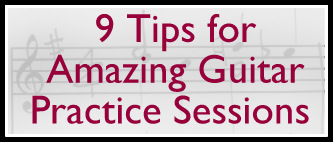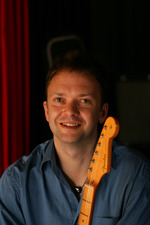This is a guest blog post by Auckland Guitarist/Educator Dylan Kay.
Originally published as "The How of Practising".
***

There’s always a lot of discussion about “what” to practise, but you should also consider “how” to practise. Here are some things I’ve discovered to be valuable.
1. Goals
Be realistic about the amount of time you can practise each day and what you want to achieve.
• Write a list of your goals.
• Work out what you need to practise to achieve them.
• Decide what’s most important now, and make a start.
Remember that this is a lifelong thing. You don’t have to do it all by next week.
2. Consistency. Persistence. Motivation.
Keeping motivated is hard. Especially as most things you practise will only start to bear fruit after many months. But persistence and consistent practice is the key to achieving your goals.
One great piece of advice that keeps me motivated is to “practise what you love”. We can’t practise everything - focus on the things you really enjoy practising.
3. Healthy practice
We are upper body athletes, and need to treat our practice sessions as seriously as any other athlete regards their training sessions.
• Warming up (check out the BAPAM warmup exercises),
• Drinking plenty of water whilst practising
• Do stretches after the session.
• Stand up to practise sometimes. Not only does it prepare you better for gigs, but it also helps to counteract poor seated posture.
If you are having problems, you might want to check out the Alexander Technique.
4. Use a metronome
Wherever possible. (That means just about all the time). Work on your sense of time and groove as you practise other material.
5. Plug in
Playing electric guitar “acoustically” might keep the neighbours happier, but you’ll find you tend to pick harder...
6. The Internet
All the information and material you could ever need is available somewhere on the Internet. This is both good and (mainly) bad.
• There is a very real danger of becoming overwhelmed and thinking that you somehow have to keep up with it all.
• The key to making fast progress is how to apply and integrate this material into your playing. The raw information itself is useless without this.
7. Distractions
• Turn off your phone.
• Log off the Internet and Facebook.
• Find somewhere quiet to practise.
• You might even start by meditating for a few minutes to get focused.
Don’t be distracted from your goals by what your friends are practising, or that latest cool guitar DVD, or something you found on YouTube.
Remember that this is between you and the instrument. Don’t worry about what anyone else is working on or doing. Take it at your own pace.
8. The perils of study
It is easy to get trapped in a cycle of studying all the time and being a “student”.
• Remember to take time every day to just “play”.
• You should actively seek “your” music – what is that unique thing that you have to say on your instrument?
The most important tip for practicing is simply this –
9. Turn Up and Do It.
About:

This is a guest blog post by Auckland Guitarist/Educator Dylan Kay. He was educated in Berklee College of Music, the Guitar Institute and Oxford University. A former faculty member of Guitar Institute in London, he now performs and teaches in Auckland, New Zealand. His guitar lessons in Auckland site is here: http://www.aucklandguitarschool.co.nz/
---------
Join my newsletter for a FREE 7-song acoustic guitar MP3 compilation
& to be updated of new blog posts, videos, upcoming shows & exclusive content.
100% privacy and I promise never to spam you.
_________
❤ If you liked this post, please Like it or Tweet it! =)
 Monday, February 3, 2014 at 11:35AM
Monday, February 3, 2014 at 11:35AM 


